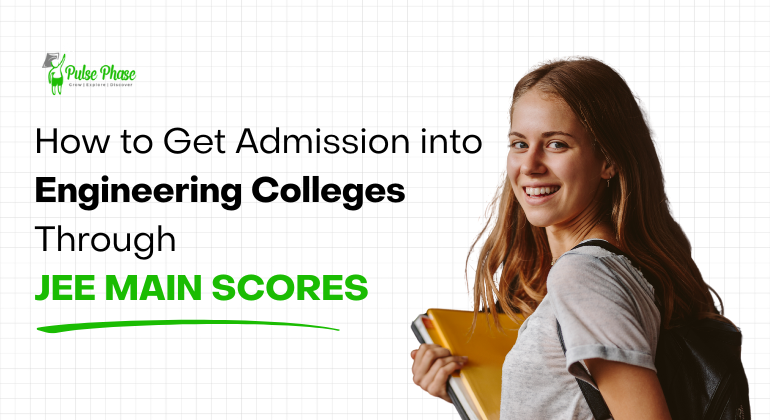Engineering remains one of the most important professions in India. Every year lakhs of students dream of getting into prestigious engineering colleges in India. Joint Entrance Examination (JEE) main is the major door to this aspiration, particularly to get into National Institute of Technology (NITs), India Institutes of Information Technology (IIITs), Government Funded Technical Institutes (GFTIs), and numerous other private engineering colleges.
To successfully tackle the JEE Main process, one needs to thoroughly understand the examination pattern, eligibility, criteria, preparation strategy, and counselling process. This article is a complete guide for students and parents who want to know how to get engineering college admissions through JEE Main.
WHAT IS JEE MAIN?
The Joint Entrance Examination (JEE) Main is a national-level entrance test organized by the National Testing Agency. It is the first part of the two-tier JEE examination; the other being JEE Advanced, required to get into the Indian Institute of Technology (NIT).
Yet even without taking the JEE Advanced test, a good score in the JEE Main can ensure admission into many of the top engineering colleges.
ELIGIBILITY CRITERIA
Candidates need to ensure that they meet the basic eligibility criteria before applying:
- Age limit: There is no age restriction for appearing in JEE Main. However, candidates need to look at the individual institute’s age criteria
- Qualification: Students need to have passed their Class 12 or equivalent examination with compulsory subjects of Mathematics and Physics along with Chemistry/Biology/Technical Vocational Subject
- Year of passing: All those candidates who have passed class 12 in the current year or the previous year or are appearing in the same academic year, are eligible.
- Number of attempts: A candidate can attempt JEE Main for a maximum of three consecutive years, and the exam is held twice a year, hence, six attempts are given at most.
JEE MAIN EXAM PATTERN
Knowing the exam pattern is of fundamental importance in order to prepare well:
Paper 1 (B.E./B.Tech)
Mode: Online computer-based test (CBT)
Subjects: Physics, Chemistry. Mathematics
Duration: 3 hours
Total Questions: 90 questions (30 questions from each subject; 20 MCQs + 10 numerical – 5 to be attempted.
Marking Scheme: +4 for correct, -1 for incorrect MCQ, and no negative marking for numerical questions.
Total Marks: 300
Paper 2A (B.Arch) and paper 2B (B.Planning) exist, too, but only for architecture/planning students.
ADMISSION STEP-BY-STEP GUIDE THROUGH JEE MAIN
- Register and Take the Test: Begin by registering on the official JEE Main portal (https://jeemain.nta.nic.in/) during the application period. Provide personal and academic information, upload required documents, and pay the test fee.
Students may opt to appear in either or both of the attempts conducted in January and April. The better of the two is used for ranking
- Prepare strategically: Passing JEE Main depends on how wisely and persistently you prepare. Here’s a general guideline:
A. Know the Syllabus Thoroughly
Synchronize your class 11 and 12 NCERT books with the JEE Main Syllabus.
Study fundamentals first before rushing into problems of an advanced level.
B. Make a Timetable. Allocate equal time to Physics, Chemistry, and Math. Leave time for mock tests, revision, and concept consolidation.
C. Practice Regularly: Attempt previous years’ question papers and give online mock tests. Utilize websites like NTA Abhyas App, or join test series offered by well-known coaching institutions.
D. Time Management and Accuracy.
Accuracy is more important than attempting every question in the actual test.
- Result and Score Normalization: After the exam, NTA publishes the normalized percentile score for each session and subject. The percentile score is your performance against other candidates in your session. After these scores, an All India Rank (AIR) is created once both sessions are over.
Counseling and Admission Procedure
- JoSAA Counseling
The JoSAA ( Joint Seat Allocation Authority) manages all the centralized counselling procedures for IITs, NITs, and GFTIs.
The procedure starts after the JEE Advanced announcement but is available for JEE Main qualifiers as well.
Process in JoSAA Counseling: Registration & Choice Filling: Provide your favorite colleges and branches according to your rank. Mock Allotment: Assists candidates in modifying choices based on estimated results.
Locking the Final Choice: Prior to the deadlines, confirm your choices.
Seat Allotment Rounds: Typically 6–7 rounds, based on merit and preferences.
Acceptance of Seat: Deposit the seat acceptance fee, upload documents, and confirm them online.
Reporting: Report to the institute allocated or float the seat for higher preference in subsequent rounds.
- CSAB Special Rounds
Special rounds are held, post JoSAA rounds, by the Central Seat Allocation Board (CSAB) to fill the remaining seats in IITs, NITs, and GFTIs.
For example, Maharashtra, Odisha, Haryana, etc., carry out state counseling separately.
Well-known private colleges such as VIT, Shiv Nadar, UPES, IIIT-Hyderabad, and Amrita also accept JEE Main ranks. Apply separately for these colleges.
Best Engineering Colleges that accept JEE Main Scores.
Some of the well-known institutions:
- National Institutes of Technology (NITs): NIT Trichy, NIT Surathkal, NIT Warangal, NIT Rourkela.
- IIITs: IIIT Hyderabad (it has a separate admission process), IIIT Delhi, IIIT Allahabad
- GFTIs: Institute of Engineering and Technology, DAVV; Assam University; Punjab Engineering College, etc.
Top Private Colleges:
Jaypee, LNMIIT, DAIICT, SRM (partially), and others.
Tips for a Successful Admission Journey
- Start Early: Begin preparation from Class 11 to build a strong foundation.
- Stay Consistent: Daily practice and self-assessment are essential.
- Join a Test Series: Get exam-day experience and improve performance.
- Use JEE Rank Predictors and College Predictors: These tools provide insights into expected colleges based on your performance.
- Be Calm and Composed: Emotional balance and mental sanity are most important during the exam and counseling periods.
Getting admission into engineering colleges via JEE Main is a competitive but attainable objective. By adopting the right approach, studying with discipline and direction, and having a proper idea of how admissions are conducted, students can find seats in premier institutions. The secret lies not just in passing the exam but in making informed decisions during the counseling and seat allotment process.
JEE Main is not just an exam, it’s a journey. One that requires patience, persistence, and planning. But for those who plan well, it unlocks the gates to some of India’s premier engineering colleges and a shining professional future ahead.
referral articles:




